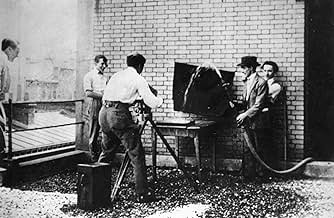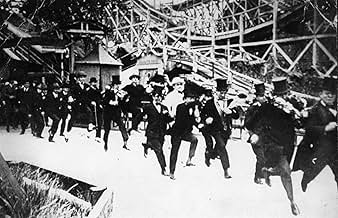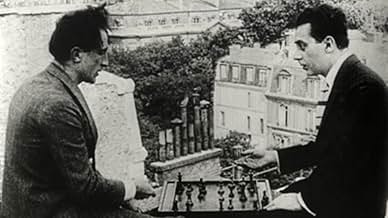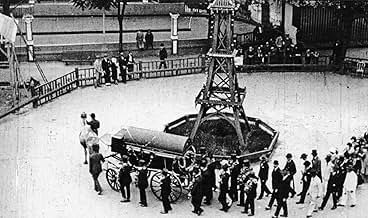Entr'acte
- 1924
- 22 मि
IMDb रेटिंग
7.3/10
4.4 हज़ार
आपकी रेटिंग
अपनी भाषा में प्लॉट जोड़ेंAn absolute dada movie. Somebody gets killed, his coffin gets out of control and after a chase it stops. The person gets out of it and let everybody who followed the coffin dissapear.An absolute dada movie. Somebody gets killed, his coffin gets out of control and after a chase it stops. The person gets out of it and let everybody who followed the coffin dissapear.An absolute dada movie. Somebody gets killed, his coffin gets out of control and after a chase it stops. The person gets out of it and let everybody who followed the coffin dissapear.
Inge Frïss
- La ballerine
- (as Mlle Frïss)
Man Ray
- Un joueur d'échecs
- (as Man-Ray)
Marcel Achard
- Un homme qui suit le corbillard
- (बिना क्रेडिट के)
Georges Auric
- Un homme qui suit le corbillard
- (बिना क्रेडिट के)
Georges Charensol
- Un homme qui suit le corbillard
- (बिना क्रेडिट के)
Georges Lacombe
- Un homme qui suit le corbillard
- (बिना क्रेडिट के)
Roger Le Bon
- Un homme qui suit le corbillard
- (बिना क्रेडिट के)
Jean Mamy
- Un homme qui suit le corbillard
- (बिना क्रेडिट के)
Rolf de Maré
- Un homme qui suit le corbillard
- (बिना क्रेडिट के)
Erik Satie
- Un homme qui charge le canon
- (बिना क्रेडिट के)
Pierre Scize
- Un homme qui suit le corbillard
- (बिना क्रेडिट के)
Louis Touchages
- Un homme qui suit le corbillard
- (बिना क्रेडिट के)
फ़ीचर्ड समीक्षाएं
We were shown this film in a class where at least once during each class, I start to nod off to sleep. Maybe it's the time of day, or the too-dark lights, but even during one of the Jean Vigo films we saw it didn't grab me. This one did, however, as it is one of the best short films of the 20's, or at least one of the more ambitious ones of the time. There are plenty of Freudian symbols, or maybe spoofs and in-jokes on the symbols (i.e. phallic imagery, cannons, guns, balls, and obsessions with looking up women's skirts).
But more importantly there is an almost need to break through anything expectable. Unlike Bunuel's Un Chien Andalou, however, Entr'acte even goes for the manic and cartoon-like. Like Bunuel's film, there COULD be a certain thread of a story in the proceeding, if you try to take one to mind- here the story could be the unexpected tragedy of death turned up on its own head. However there is also the latter part of the film, which involves a large group running after (in trademark, hilarious fast-motion film) a hearse running down a road. It's a kind of peak of stimulating silent-film cinema, where everything being done can now be just as easily done- and is- on a daily basis by music video directors.
Yet Clair is so inventive with his techniques, of pushing a speed and tempo with his style, that it works well despite making no sense on the surface. It's a film made in the heights of French impressionism and surrealism, and the almost sheer confidence of the filmmaker here propels it into being unforgettable in a way. Most will seek out the Bunuel early works first, of course, but along the way this is worth a shot. At the least, you'll have your own interpretation once its done, not shoved down your throat.
But more importantly there is an almost need to break through anything expectable. Unlike Bunuel's Un Chien Andalou, however, Entr'acte even goes for the manic and cartoon-like. Like Bunuel's film, there COULD be a certain thread of a story in the proceeding, if you try to take one to mind- here the story could be the unexpected tragedy of death turned up on its own head. However there is also the latter part of the film, which involves a large group running after (in trademark, hilarious fast-motion film) a hearse running down a road. It's a kind of peak of stimulating silent-film cinema, where everything being done can now be just as easily done- and is- on a daily basis by music video directors.
Yet Clair is so inventive with his techniques, of pushing a speed and tempo with his style, that it works well despite making no sense on the surface. It's a film made in the heights of French impressionism and surrealism, and the almost sheer confidence of the filmmaker here propels it into being unforgettable in a way. Most will seek out the Bunuel early works first, of course, but along the way this is worth a shot. At the least, you'll have your own interpretation once its done, not shoved down your throat.
This is an avant-garde movie and as such it's theme and plot are unclear, which is as intended because the movie is ore about special effects than about telling an actual story. This movie directs the audiences' attention to such everyday occurrences as movement, personal interactions, dancing, and running. People are part of some kind of funeral procession, but what catches the attention is the various actions that take place as the procession proceeds. Mourning is replaced by an almost frenetic need to stay active, and the movie shows this through the use of some innovative techniques, including slow-motion, use of montage, and multiple superimposed exposures, all of which convey the sense that something intense is happening. This movie is an excellent example of the French avant-garde genre which had a major influenced on cinematic styles in Europe and the United States.
This short film was conceived (hence the title) by René Clair as a diversion for the interval of the absurdist-Dadaist ballet "Relâche", with screenplay by Francis Picabia and music by Erik Satie, both artists at the forefront of the contemporary Parisian avant-garde. At the supposed first night performance in 1924, expectant patrons were greeted by locked doors and a notice bearing the single word "Relâche", which is the French word for "No Show". How absurd! Oh what fun!
To accompany the film, Satie composed a striking piece of orchestral music (arguably more significant than that for the ballet itself), and as expected the remastered film now has this added as its soundtrack, and a pretty good job has been made of editing the music to the action on the screen. This latter consists of a medley of surrealist sequences, culminating in a funeral procession, led by a camel, which escalates into a manic chase, intercut with footage from a big dipper. At the end, all the mourners disappear into thin air one by one; the corpse lives on. How significant all this is, as a narrative itself, as well as in the history of cinema as a whole, I am not qualified to comment, but it must have been seen as groundbreaking at the time, as well as good absurdist fun.
At the start of the film is a short sequence of two men firing a cannon from the roof of the Théâtre des Champs-Elysées and jumping up and down, which was shown separately at the opening of the ballet, not as part of Entr'acte. The two men are Picabia and Satie themselves. This footage is especially poignant, as Satie himself was dead within a year.
For Region 2 viewers, Entr'acte is included as a bonus with Clair's much later masterpiece "Les Grandes Manoeuvres".
To accompany the film, Satie composed a striking piece of orchestral music (arguably more significant than that for the ballet itself), and as expected the remastered film now has this added as its soundtrack, and a pretty good job has been made of editing the music to the action on the screen. This latter consists of a medley of surrealist sequences, culminating in a funeral procession, led by a camel, which escalates into a manic chase, intercut with footage from a big dipper. At the end, all the mourners disappear into thin air one by one; the corpse lives on. How significant all this is, as a narrative itself, as well as in the history of cinema as a whole, I am not qualified to comment, but it must have been seen as groundbreaking at the time, as well as good absurdist fun.
At the start of the film is a short sequence of two men firing a cannon from the roof of the Théâtre des Champs-Elysées and jumping up and down, which was shown separately at the opening of the ballet, not as part of Entr'acte. The two men are Picabia and Satie themselves. This footage is especially poignant, as Satie himself was dead within a year.
For Region 2 viewers, Entr'acte is included as a bonus with Clair's much later masterpiece "Les Grandes Manoeuvres".
Originally played as an intermission with no sound, this film is now a must for any fan/historian of fine art. Featuring cameos by Man Ray, Marcel Duchamp, and other notables, Clair and Picabia's dada collage of different narratives, experimental use of the camera, and surrealist and absurdist images is the best example of experimental or dadaist films from the period. As unusual as it is to watch a film with no sound, the images created by the artists provide an extremely unique experience for the viewer. Fun for anyone, and especially interesting for those acquainted with the artists or the art movements themselves.
10m67165
This is it, for me! Absolute pure cinematic fun! This movie is not trying to tell you a story, although there is a plot about a funeral that ends up transforming into some unexpected events. I just had to laugh, and also marvel at some images that are simply beautiful, like some sort of silent visual music.
What the director does is basically a collage of absurd images and some camera tricks. These involve some artists of the time. I must say I am quite surprised by its freshness even today. Now I know where musical video clips come from! The first time I saw it, I was going to see some old silent movies, and this one was shown first, and I had no idea what it was all about. In a way, I still don't, and that's even better! Stop making sense for a while and start the fun!
What the director does is basically a collage of absurd images and some camera tricks. These involve some artists of the time. I must say I am quite surprised by its freshness even today. Now I know where musical video clips come from! The first time I saw it, I was going to see some old silent movies, and this one was shown first, and I had no idea what it was all about. In a way, I still don't, and that's even better! Stop making sense for a while and start the fun!
क्या आपको पता है
- ट्रिवियाThe ballet "Relâche" ("Theatre Closed") premiered at the Théâtre des Champs Elyseés in Paris on December 4, 1924. Based on a book and with settings by Francis Picabia, it was a ballet in two acts commissioned and staged by the Ballets Suédois of Rolf de Maré, with choreography by Jean Börlin. As the title "Entr'acte" implies, this film was shown between the two acts, with music by Erik Satie.
- गूफ़Obvious stand-in for the close-up of Rolf de Maré getting kicked in head, which sends him (via reverse motion) flying back into the end title. The "kick" itself is clearly achieved through reverse motion.
- इसके अलावा अन्य वर्जनThere is an Italian edition of this film on DVD, distributed by DNA Srl (2 Films on a single DVD). The film has been re-edited with the contribution of film historian Riccardo Cusin. This version is also available for streaming on some platforms.
- कनेक्शनEdited into Avant-garde Cinema (1960)
टॉप पसंद
रेटिंग देने के लिए साइन-इन करें और वैयक्तिकृत सुझावों के लिए वॉचलिस्ट करें
विवरण
- चलने की अवधि22 मिनट
- रंग
- ध्वनि मिश्रण
- पक्ष अनुपात
- 1.33 : 1
इस पेज में योगदान दें
किसी बदलाव का सुझाव दें या अनुपलब्ध कॉन्टेंट जोड़ें























